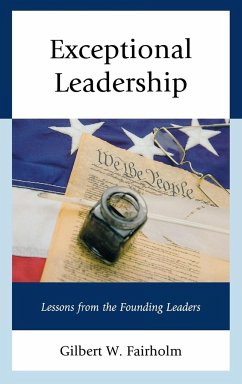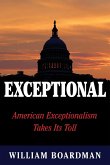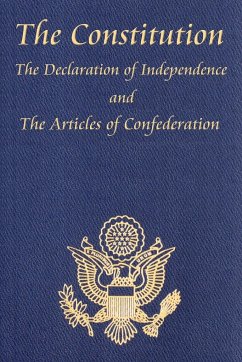- Gebundenes Buch
- Merkliste
- Auf die Merkliste
- Bewerten Bewerten
- Teilen
- Produkt teilen
- Produkterinnerung
- Produkterinnerung
America is best described by values of independence, freedom, and liberty. These values led our founding leaders to undertake revolution. America is American because being Americans each of us assimilates from birth these ideals and values. Americans intuitively assume that they have rights that no one-not their bosses or even government can take away. They see themselves as free enough to choose the kind of life they will live and able to move from where they are to anyplace else-both literally and metaphysically. American workers think they have the right to work or not to work according to…mehr
Andere Kunden interessierten sich auch für
![Presidential Leadership in the Americas since Independence Presidential Leadership in the Americas since Independence]() Guy BurtonPresidential Leadership in the Americas since Independence60,99 €
Guy BurtonPresidential Leadership in the Americas since Independence60,99 €![Presidential Leadership in the Americas since Independence Presidential Leadership in the Americas since Independence]() Guy BurtonPresidential Leadership in the Americas since Independence131,99 €
Guy BurtonPresidential Leadership in the Americas since Independence131,99 €![The Midnight Hour The Midnight Hour]() Bud HarrisThe Midnight Hour12,99 €
Bud HarrisThe Midnight Hour12,99 €![EXCEPTIONAL EXCEPTIONAL]() William BoardmanEXCEPTIONAL35,99 €
William BoardmanEXCEPTIONAL35,99 €![The Prohibition of Torture in Exceptional Circumstances The Prohibition of Torture in Exceptional Circumstances]() Michelle FarrellThe Prohibition of Torture in Exceptional Circumstances48,99 €
Michelle FarrellThe Prohibition of Torture in Exceptional Circumstances48,99 €![RESTORE OUR DEMOCRACY - The Case for Equality and Justice RESTORE OUR DEMOCRACY - The Case for Equality and Justice]() Werner NeffRESTORE OUR DEMOCRACY - The Case for Equality and Justice10,99 €
Werner NeffRESTORE OUR DEMOCRACY - The Case for Equality and Justice10,99 €![The Constitution of the United States of America, with the Bill of Rights and All of the Amendments; The Declaration of Independence; And the Articles The Constitution of the United States of America, with the Bill of Rights and All of the Amendments; The Declaration of Independence; And the Articles]() Thomas JeffersonThe Constitution of the United States of America, with the Bill of Rights and All of the Amendments; The Declaration of Independence; And the Articles11,99 €
Thomas JeffersonThe Constitution of the United States of America, with the Bill of Rights and All of the Amendments; The Declaration of Independence; And the Articles11,99 €-
-
-
America is best described by values of independence, freedom, and liberty. These values led our founding leaders to undertake revolution. America is American because being Americans each of us assimilates from birth these ideals and values. Americans intuitively assume that they have rights that no one-not their bosses or even government can take away. They see themselves as free enough to choose the kind of life they will live and able to move from where they are to anyplace else-both literally and metaphysically. American workers think they have the right to work or not to work according to their-the worker's-standards and values of what is appropriate. They grant their bosses fealty as a personal decision and not through compulsion. Of course, most Americans understand that work life entails some limits on personal freedom. But, importantly, the idea and the ideal of freedom are fundamentally present in their make-up. Figuratively, the sky is the only limit to our potential for personal and professional development. Workers expect these values to be honored in the workplace. When they are not, they expend energy in thwarting work systems to maximize their ability to do what their leader wants, but in their way.
Hinweis: Dieser Artikel kann nur an eine deutsche Lieferadresse ausgeliefert werden.
Hinweis: Dieser Artikel kann nur an eine deutsche Lieferadresse ausgeliefert werden.
Produktdetails
- Produktdetails
- Verlag: Lexington Books
- Seitenzahl: 334
- Erscheinungstermin: 20. Juni 2013
- Englisch
- Abmessung: 235mm x 157mm x 24mm
- Gewicht: 694g
- ISBN-13: 9780739184141
- ISBN-10: 0739184148
- Artikelnr.: 37743406
- Herstellerkennzeichnung
- Libri GmbH
- Europaallee 1
- 36244 Bad Hersfeld
- gpsr@libri.de
- Verlag: Lexington Books
- Seitenzahl: 334
- Erscheinungstermin: 20. Juni 2013
- Englisch
- Abmessung: 235mm x 157mm x 24mm
- Gewicht: 694g
- ISBN-13: 9780739184141
- ISBN-10: 0739184148
- Artikelnr.: 37743406
- Herstellerkennzeichnung
- Libri GmbH
- Europaallee 1
- 36244 Bad Hersfeld
- gpsr@libri.de
By Gilbert W. Fairholm
Acknowledgments Chapter 1: Introduction: American Exceptional Leadership
The Responsibilities of Both Leader and Led The Founding Documents and the
Values and Principles Contained Therein About America Exceptionalism
Chapter 2: Enduring Values That Made America American The Scope of Concern
Natural rights Universal Human Equality Opportunity Facilitating Happiness
Liberty and Independence Freedom Fairness Chapter 3: Enduring Principles of
Leadership Action Leadership Principles Embedded in the Constitution
Nurturing Unity-"We the People" Justice, Happiness and Peace-"establish
justice, insure domestic tranquility" Defense-"provide for the common
defense..." Facilitating Commerce-"promote the general welfare..."
Individual Freedom and Independence-"the blessings of liberty..."
Organizing Principles Embedded in the Preamble of the Constitution Consent
of the Governed The Separation of Powers Checks and Balances3 Division of
Powers and Responsibilities External Agency [Foreign] Entanglements
Factional Negotiations and Compromise PART I: The Formative Years
Introduction Chapter 4: America's Independent Spirit Yankee Doodle
Background and Provisions Implications for Leaders Chapter 5: Unity, The
Albany Plan of Union, 1754 Background and Provisions Implications for
Leaders Chapter 6: Inherent Rights to Property and Happiness The Virginia
Bill of Rights, June 12, 1776 Background and Provisions Implications for
Leaders Chapter 7: The Preeminence of Natural Rights July 4, 1776, The
Unanimous Declaration Of The Thirteen United States Of America Background
and Provisions Implications for Leaders Chapter 8: Moral Leadership through
Service The Virginia Act for Establishing Religious Freedom, 1786
Background and Provisions Implications for Leaders Chapter 9: Organizing
for Union, Justice, and the General Welfare The Constitution of the United
States The Bill of Rights Background and Provisions Implications for
Leaders PART II: Development of a New Nation Introduction and Commentary
The Northwest Ordinance of 1787 Federalist Paper No. 10 (1787-8) The United
States Judiciary Act of 1789 George Washington's Farewell Address (1796)
Thomas Jefferson's First Inaugural Address (1803) The Star-Spangled Banner
(1814) Chapter 10: Overcoming Internal Conflict Federalist #10 - The Size
and Variety of the Union as a Check on Faction, Daily Advertiser, New York:
New York. Thursday, November 22, 1787, James Madison Background and
Provisions Implications for Leaders Chapter 11: Finding Liberty via
Organizational Leadership An Act to Establish The Judicial Courts Of The
United States. 1789 Background and Provisions Implications for Leaders
Chapter 12: Linking Religion, Morality, and Education to Leadership The
Northwest Ordinance, July 13, .1787: An Ordinance for The Government Of The
Territory Of The United States Northwest Of The River Ohio Background and
Provisions Implications for Leaders Chapter 13: Preserving Unity from
Internal and External Rivalries George Washington's Farewell Address, 1796
Background and Provisions Implications for Leaders Chapter 14: Equal and
Exact Justice to All Thomas Jefferson's First Inaugural Address, 1801
Background and Provisions Implications for Leaders Chapter 15: Coordinating
Leadership Under Law Marbury v. Madison, 1803 Background and Provisions
Implications for Leaders Chapter 16: Leading with Courage, Liberty, and
Continuity "The Star-Spangled Banner" - 1814 Background and Provisions
Implications for Leaders PART III: The Early National Period 1816-1855
Introduction and Commentary An Act Prohibiting Importation of Slaves of
1807 The Monroe Doctrine (1823) Cherokee Nation v. Georgia (1831) "My
Country, 'Tis of Thee" (1831) Chapter 17: Prioritizing Freedom over Profit
Act To Prohibit the Importation of Slaves 1807 Background and Provisions
Implications for Leaders Chapter 18: Protecting Prosperity and Innate
Freedoms Madison's War Message. June 1, 1812 Background and Provisions
Implications for Leaders Chapter 19: Seeking Unity amid Diversity Report
and Resolutions of the Hartford Convention Background and Provisions
Implications for Leaders Chapter 20: Leading toward the Future The Monroe
Doctrine--Extracts From President Monroe's Seventh Annual Message To
Congress. December 2, 1823 Background and Provisions Implications for
Leaders Chapter 21: Balance in Leading Free and Independent People Fairly
Cherokee Nation V. Georgia 1831 Background and Provisions Implications for
Leaders Chapter 22: Leadership is Changing Attitudes "My Country, 'Tis of
Thee" Background and Provisions Implications for Leaders Chapter 23:
American Leadership Has a Paper Trail Core Values That Still Inform
American Leadership Human Rights Building Unity The Meaning of Equality
Happiness Liberty and Independence Chapter 24: Principles Guiding Effective
Human Relationships Exceptional Leadership Take Place in Interpersonal
Relationships Separation of Powers and Checks and Balances Morality and
Religion Freedom Wellbeing Negotiation and Compromise Extra-organizational
Relations The Meaning of Justice Bibliography Founding Documents References
Leadership References
The Responsibilities of Both Leader and Led The Founding Documents and the
Values and Principles Contained Therein About America Exceptionalism
Chapter 2: Enduring Values That Made America American The Scope of Concern
Natural rights Universal Human Equality Opportunity Facilitating Happiness
Liberty and Independence Freedom Fairness Chapter 3: Enduring Principles of
Leadership Action Leadership Principles Embedded in the Constitution
Nurturing Unity-"We the People" Justice, Happiness and Peace-"establish
justice, insure domestic tranquility" Defense-"provide for the common
defense..." Facilitating Commerce-"promote the general welfare..."
Individual Freedom and Independence-"the blessings of liberty..."
Organizing Principles Embedded in the Preamble of the Constitution Consent
of the Governed The Separation of Powers Checks and Balances3 Division of
Powers and Responsibilities External Agency [Foreign] Entanglements
Factional Negotiations and Compromise PART I: The Formative Years
Introduction Chapter 4: America's Independent Spirit Yankee Doodle
Background and Provisions Implications for Leaders Chapter 5: Unity, The
Albany Plan of Union, 1754 Background and Provisions Implications for
Leaders Chapter 6: Inherent Rights to Property and Happiness The Virginia
Bill of Rights, June 12, 1776 Background and Provisions Implications for
Leaders Chapter 7: The Preeminence of Natural Rights July 4, 1776, The
Unanimous Declaration Of The Thirteen United States Of America Background
and Provisions Implications for Leaders Chapter 8: Moral Leadership through
Service The Virginia Act for Establishing Religious Freedom, 1786
Background and Provisions Implications for Leaders Chapter 9: Organizing
for Union, Justice, and the General Welfare The Constitution of the United
States The Bill of Rights Background and Provisions Implications for
Leaders PART II: Development of a New Nation Introduction and Commentary
The Northwest Ordinance of 1787 Federalist Paper No. 10 (1787-8) The United
States Judiciary Act of 1789 George Washington's Farewell Address (1796)
Thomas Jefferson's First Inaugural Address (1803) The Star-Spangled Banner
(1814) Chapter 10: Overcoming Internal Conflict Federalist #10 - The Size
and Variety of the Union as a Check on Faction, Daily Advertiser, New York:
New York. Thursday, November 22, 1787, James Madison Background and
Provisions Implications for Leaders Chapter 11: Finding Liberty via
Organizational Leadership An Act to Establish The Judicial Courts Of The
United States. 1789 Background and Provisions Implications for Leaders
Chapter 12: Linking Religion, Morality, and Education to Leadership The
Northwest Ordinance, July 13, .1787: An Ordinance for The Government Of The
Territory Of The United States Northwest Of The River Ohio Background and
Provisions Implications for Leaders Chapter 13: Preserving Unity from
Internal and External Rivalries George Washington's Farewell Address, 1796
Background and Provisions Implications for Leaders Chapter 14: Equal and
Exact Justice to All Thomas Jefferson's First Inaugural Address, 1801
Background and Provisions Implications for Leaders Chapter 15: Coordinating
Leadership Under Law Marbury v. Madison, 1803 Background and Provisions
Implications for Leaders Chapter 16: Leading with Courage, Liberty, and
Continuity "The Star-Spangled Banner" - 1814 Background and Provisions
Implications for Leaders PART III: The Early National Period 1816-1855
Introduction and Commentary An Act Prohibiting Importation of Slaves of
1807 The Monroe Doctrine (1823) Cherokee Nation v. Georgia (1831) "My
Country, 'Tis of Thee" (1831) Chapter 17: Prioritizing Freedom over Profit
Act To Prohibit the Importation of Slaves 1807 Background and Provisions
Implications for Leaders Chapter 18: Protecting Prosperity and Innate
Freedoms Madison's War Message. June 1, 1812 Background and Provisions
Implications for Leaders Chapter 19: Seeking Unity amid Diversity Report
and Resolutions of the Hartford Convention Background and Provisions
Implications for Leaders Chapter 20: Leading toward the Future The Monroe
Doctrine--Extracts From President Monroe's Seventh Annual Message To
Congress. December 2, 1823 Background and Provisions Implications for
Leaders Chapter 21: Balance in Leading Free and Independent People Fairly
Cherokee Nation V. Georgia 1831 Background and Provisions Implications for
Leaders Chapter 22: Leadership is Changing Attitudes "My Country, 'Tis of
Thee" Background and Provisions Implications for Leaders Chapter 23:
American Leadership Has a Paper Trail Core Values That Still Inform
American Leadership Human Rights Building Unity The Meaning of Equality
Happiness Liberty and Independence Chapter 24: Principles Guiding Effective
Human Relationships Exceptional Leadership Take Place in Interpersonal
Relationships Separation of Powers and Checks and Balances Morality and
Religion Freedom Wellbeing Negotiation and Compromise Extra-organizational
Relations The Meaning of Justice Bibliography Founding Documents References
Leadership References
Acknowledgments Chapter 1: Introduction: American Exceptional Leadership
The Responsibilities of Both Leader and Led The Founding Documents and the
Values and Principles Contained Therein About America Exceptionalism
Chapter 2: Enduring Values That Made America American The Scope of Concern
Natural rights Universal Human Equality Opportunity Facilitating Happiness
Liberty and Independence Freedom Fairness Chapter 3: Enduring Principles of
Leadership Action Leadership Principles Embedded in the Constitution
Nurturing Unity-"We the People" Justice, Happiness and Peace-"establish
justice, insure domestic tranquility" Defense-"provide for the common
defense..." Facilitating Commerce-"promote the general welfare..."
Individual Freedom and Independence-"the blessings of liberty..."
Organizing Principles Embedded in the Preamble of the Constitution Consent
of the Governed The Separation of Powers Checks and Balances3 Division of
Powers and Responsibilities External Agency [Foreign] Entanglements
Factional Negotiations and Compromise PART I: The Formative Years
Introduction Chapter 4: America's Independent Spirit Yankee Doodle
Background and Provisions Implications for Leaders Chapter 5: Unity, The
Albany Plan of Union, 1754 Background and Provisions Implications for
Leaders Chapter 6: Inherent Rights to Property and Happiness The Virginia
Bill of Rights, June 12, 1776 Background and Provisions Implications for
Leaders Chapter 7: The Preeminence of Natural Rights July 4, 1776, The
Unanimous Declaration Of The Thirteen United States Of America Background
and Provisions Implications for Leaders Chapter 8: Moral Leadership through
Service The Virginia Act for Establishing Religious Freedom, 1786
Background and Provisions Implications for Leaders Chapter 9: Organizing
for Union, Justice, and the General Welfare The Constitution of the United
States The Bill of Rights Background and Provisions Implications for
Leaders PART II: Development of a New Nation Introduction and Commentary
The Northwest Ordinance of 1787 Federalist Paper No. 10 (1787-8) The United
States Judiciary Act of 1789 George Washington's Farewell Address (1796)
Thomas Jefferson's First Inaugural Address (1803) The Star-Spangled Banner
(1814) Chapter 10: Overcoming Internal Conflict Federalist #10 - The Size
and Variety of the Union as a Check on Faction, Daily Advertiser, New York:
New York. Thursday, November 22, 1787, James Madison Background and
Provisions Implications for Leaders Chapter 11: Finding Liberty via
Organizational Leadership An Act to Establish The Judicial Courts Of The
United States. 1789 Background and Provisions Implications for Leaders
Chapter 12: Linking Religion, Morality, and Education to Leadership The
Northwest Ordinance, July 13, .1787: An Ordinance for The Government Of The
Territory Of The United States Northwest Of The River Ohio Background and
Provisions Implications for Leaders Chapter 13: Preserving Unity from
Internal and External Rivalries George Washington's Farewell Address, 1796
Background and Provisions Implications for Leaders Chapter 14: Equal and
Exact Justice to All Thomas Jefferson's First Inaugural Address, 1801
Background and Provisions Implications for Leaders Chapter 15: Coordinating
Leadership Under Law Marbury v. Madison, 1803 Background and Provisions
Implications for Leaders Chapter 16: Leading with Courage, Liberty, and
Continuity "The Star-Spangled Banner" - 1814 Background and Provisions
Implications for Leaders PART III: The Early National Period 1816-1855
Introduction and Commentary An Act Prohibiting Importation of Slaves of
1807 The Monroe Doctrine (1823) Cherokee Nation v. Georgia (1831) "My
Country, 'Tis of Thee" (1831) Chapter 17: Prioritizing Freedom over Profit
Act To Prohibit the Importation of Slaves 1807 Background and Provisions
Implications for Leaders Chapter 18: Protecting Prosperity and Innate
Freedoms Madison's War Message. June 1, 1812 Background and Provisions
Implications for Leaders Chapter 19: Seeking Unity amid Diversity Report
and Resolutions of the Hartford Convention Background and Provisions
Implications for Leaders Chapter 20: Leading toward the Future The Monroe
Doctrine--Extracts From President Monroe's Seventh Annual Message To
Congress. December 2, 1823 Background and Provisions Implications for
Leaders Chapter 21: Balance in Leading Free and Independent People Fairly
Cherokee Nation V. Georgia 1831 Background and Provisions Implications for
Leaders Chapter 22: Leadership is Changing Attitudes "My Country, 'Tis of
Thee" Background and Provisions Implications for Leaders Chapter 23:
American Leadership Has a Paper Trail Core Values That Still Inform
American Leadership Human Rights Building Unity The Meaning of Equality
Happiness Liberty and Independence Chapter 24: Principles Guiding Effective
Human Relationships Exceptional Leadership Take Place in Interpersonal
Relationships Separation of Powers and Checks and Balances Morality and
Religion Freedom Wellbeing Negotiation and Compromise Extra-organizational
Relations The Meaning of Justice Bibliography Founding Documents References
Leadership References
The Responsibilities of Both Leader and Led The Founding Documents and the
Values and Principles Contained Therein About America Exceptionalism
Chapter 2: Enduring Values That Made America American The Scope of Concern
Natural rights Universal Human Equality Opportunity Facilitating Happiness
Liberty and Independence Freedom Fairness Chapter 3: Enduring Principles of
Leadership Action Leadership Principles Embedded in the Constitution
Nurturing Unity-"We the People" Justice, Happiness and Peace-"establish
justice, insure domestic tranquility" Defense-"provide for the common
defense..." Facilitating Commerce-"promote the general welfare..."
Individual Freedom and Independence-"the blessings of liberty..."
Organizing Principles Embedded in the Preamble of the Constitution Consent
of the Governed The Separation of Powers Checks and Balances3 Division of
Powers and Responsibilities External Agency [Foreign] Entanglements
Factional Negotiations and Compromise PART I: The Formative Years
Introduction Chapter 4: America's Independent Spirit Yankee Doodle
Background and Provisions Implications for Leaders Chapter 5: Unity, The
Albany Plan of Union, 1754 Background and Provisions Implications for
Leaders Chapter 6: Inherent Rights to Property and Happiness The Virginia
Bill of Rights, June 12, 1776 Background and Provisions Implications for
Leaders Chapter 7: The Preeminence of Natural Rights July 4, 1776, The
Unanimous Declaration Of The Thirteen United States Of America Background
and Provisions Implications for Leaders Chapter 8: Moral Leadership through
Service The Virginia Act for Establishing Religious Freedom, 1786
Background and Provisions Implications for Leaders Chapter 9: Organizing
for Union, Justice, and the General Welfare The Constitution of the United
States The Bill of Rights Background and Provisions Implications for
Leaders PART II: Development of a New Nation Introduction and Commentary
The Northwest Ordinance of 1787 Federalist Paper No. 10 (1787-8) The United
States Judiciary Act of 1789 George Washington's Farewell Address (1796)
Thomas Jefferson's First Inaugural Address (1803) The Star-Spangled Banner
(1814) Chapter 10: Overcoming Internal Conflict Federalist #10 - The Size
and Variety of the Union as a Check on Faction, Daily Advertiser, New York:
New York. Thursday, November 22, 1787, James Madison Background and
Provisions Implications for Leaders Chapter 11: Finding Liberty via
Organizational Leadership An Act to Establish The Judicial Courts Of The
United States. 1789 Background and Provisions Implications for Leaders
Chapter 12: Linking Religion, Morality, and Education to Leadership The
Northwest Ordinance, July 13, .1787: An Ordinance for The Government Of The
Territory Of The United States Northwest Of The River Ohio Background and
Provisions Implications for Leaders Chapter 13: Preserving Unity from
Internal and External Rivalries George Washington's Farewell Address, 1796
Background and Provisions Implications for Leaders Chapter 14: Equal and
Exact Justice to All Thomas Jefferson's First Inaugural Address, 1801
Background and Provisions Implications for Leaders Chapter 15: Coordinating
Leadership Under Law Marbury v. Madison, 1803 Background and Provisions
Implications for Leaders Chapter 16: Leading with Courage, Liberty, and
Continuity "The Star-Spangled Banner" - 1814 Background and Provisions
Implications for Leaders PART III: The Early National Period 1816-1855
Introduction and Commentary An Act Prohibiting Importation of Slaves of
1807 The Monroe Doctrine (1823) Cherokee Nation v. Georgia (1831) "My
Country, 'Tis of Thee" (1831) Chapter 17: Prioritizing Freedom over Profit
Act To Prohibit the Importation of Slaves 1807 Background and Provisions
Implications for Leaders Chapter 18: Protecting Prosperity and Innate
Freedoms Madison's War Message. June 1, 1812 Background and Provisions
Implications for Leaders Chapter 19: Seeking Unity amid Diversity Report
and Resolutions of the Hartford Convention Background and Provisions
Implications for Leaders Chapter 20: Leading toward the Future The Monroe
Doctrine--Extracts From President Monroe's Seventh Annual Message To
Congress. December 2, 1823 Background and Provisions Implications for
Leaders Chapter 21: Balance in Leading Free and Independent People Fairly
Cherokee Nation V. Georgia 1831 Background and Provisions Implications for
Leaders Chapter 22: Leadership is Changing Attitudes "My Country, 'Tis of
Thee" Background and Provisions Implications for Leaders Chapter 23:
American Leadership Has a Paper Trail Core Values That Still Inform
American Leadership Human Rights Building Unity The Meaning of Equality
Happiness Liberty and Independence Chapter 24: Principles Guiding Effective
Human Relationships Exceptional Leadership Take Place in Interpersonal
Relationships Separation of Powers and Checks and Balances Morality and
Religion Freedom Wellbeing Negotiation and Compromise Extra-organizational
Relations The Meaning of Justice Bibliography Founding Documents References
Leadership References








